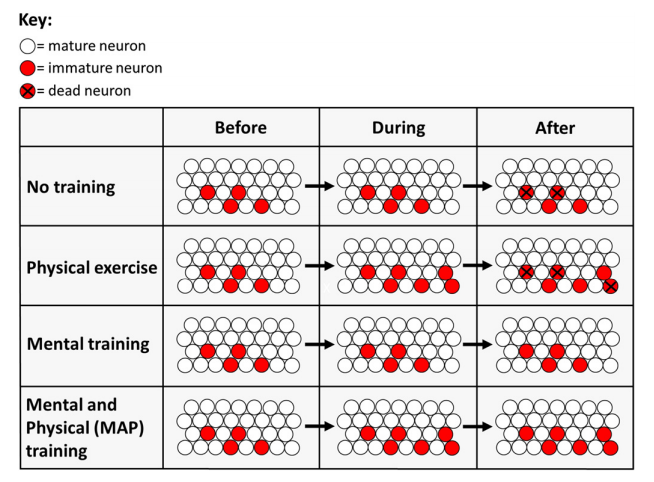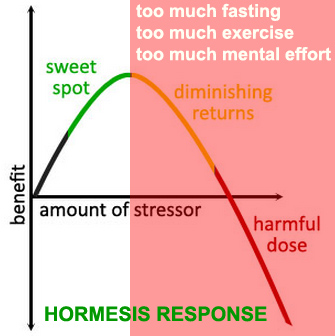We know the most effective brain training for health, resilience and performance combines effective computer based brain training with other strategies such as meditation, exercise, intermittent fasting, nutrition and sleep management. I call this brain cross training.
And we also know that apps that track performance, build habits and help with goal attainment can support an effective training program.
So let’s combine the two.
8 Week Brain Cross-Training Program
Over the next 8 weeks, I’ll be doing an intensive brain cross-training program using a number of supporting apps, and I’ll be posting updates on my progress each week.
I’ll be tracking bio- and psi- metrics to get objective measures of my training gains during this process.
My personal overall aim is to build overall mental and physical fitness, resilience and performance. But more specifically, I’m looking to get in better condition for my current academic and business projects as well as my paragliding and climbing sports goals – all of which I feel can benefit a lot from this kind of training.
The training strategies I’ll be using for this block of time are highlighted below:
Brain Cross-Training Weekly Goals
My weekly training goals with scientifically credible supporting apps (for PC desktop and iOS smart phone in my case) are as follows:
- CORE PROCESSES: x2 full Sessions (20 blocks) and x2 half sessions (10 blocks) of executive function & working memory brain training. App: HighIQPro or DNBPro.
- SKILL SETS: x2 20 minute sessions of logical reasoning training, combined with the half-sessions of working memory brain training. App: Brilliant. Mobile app.
- EXERCISE:: x2 8-10k runs per week, x3 15 minute HIITs per week, x7 yoga/stretching (15 minutes) per week. Apps: MapMyFitness, and Sworkit personalized workout app (without weights). My partner is a yoga instructor and has designed my own 15 minute yoga / stretching routine which I will post later.
- NUTRITION:: x5 Turmeric+Cacao+Black Pepper hot soya drink per week (1 teaspoon turmeric, 2 teaspoon cacao, 1 drop black pepper essential oil, soy milk). Supplements – B12, Omega 3, Magnesium and Zinc. Primarily vegetarian diet.
- INTERMITTENT FASTING:: x3 8pm – 12pm (16 hour) fasts.
- HRV COHERENCE BREATHING: x7, 10 minutes. App: HeartRate+ (set to 10 second cycles, with 4.5 seconds in-breath, 5.5 seconds outbreath).
- MEDITATION: x4 20 minute sessions. App: Headspace – as well as my own mindfulness meditation.
- SLEEP MANAGEMENT: Stop work by 10pm. In bed by 11pm. With regular meal times.
- MINDSET: COGNITIVE BIAS REDUCTION: CBT techniques to reduce stress and anxiety and improve mood. 5-10 minutes per day. App: MoodNotes and Moodkit (iOS).
Cog Neuroscience Synergy Principles
I’m tapping into these evidence-based, time-sensitive principles that can help guide our training synergies between different strategies to optimize gains.
1. Capacity-Skills Training
Learning new skills depends on working memory (WM) – e.g. learning new action sequences for chunking individual action elements of a skill together – whether motor actions (e.g. learning to play a musical instrument) or cognitive actions (e.g. learning new logical reasoning skills). Half-sessions of working memory training (e.g. i9 or DNB Pro) can be followed by skill training (e.g. logic problems) to optimize picking up the new skill sets. This works provided that you don’t over-train WM first.
Using this principle, each week I combine 2 half sessions of i9 training with logic problems training.
2. Neural Growth & Integration
As explained in this blog article, aerobic exercise results in neurogenesis – the birth of new adult brain cells. Other ‘energetic challenges’ for the body do this too, including intermittent fasting and even the effects of phytochemicals in turmeric and green tea. On the other hand mental training (meditation or brain training) helps these new cells survive and become integrated into the brain’s circuitry long-term – as shown in the diagram.
3. Hormesis Synergies
As explained in this blog article, intermittent fasting, aerobic exercise, phytochemical nutrients, and cognitive challenges (e.g. effective brain training), are all energetic stressors. They switch on stress-response genes called ‘vitagenes’ in a highly beneficial adaptive cellular stress response (CSR) that promotes health, immunity and physical and mental performance. This is called the hormesis response. Different types of stressors have overlapping but distinct patterns of benefits, and they can work synergistically together.
4. Hormesis Response Curve & Recovery
The hormesis response curve is an inverted U, and has an optimal ‘sweet spot’ for physiological stressors such as exercise or fasting. It is critical to challenge the body to the right extent, and not over do it which can quickly result in diminishing returns followed by actual harm to mind and body. Feeling bad, burned-out and wired – and having difficulties sleeping – can be a symptoms of over-training. Overtraining may also be measured by reduced heart rate variability over several days. It’s critical to rest and integrate recovery days into your schedule to ensure you have an overall intensity level that suits you.
5. Circadian Rhythms
Circadian rhythms with their associated hormonal cycles can explain how some of our daily activities are often at their most optimal at particular times of the day, as shown in the diagram below. Lots of factors come into play on any given day, but this is the general pattern.
Mental challenges are best tackled between 9-12 in the morning. Core body temperature appears to be a key determinant of cognitive performance (reference).
For this reason, I schedule my focused meditation, core and skills brain training in the morning.
Bringing It All Together: Goal Setting & Habit Building Apps
I’m experimenting with different apps including the following:
- Today – which tracks activities and helps build habits
- Way of Life – habit building and breaking app
- MapMyFitness – personal trainer designed for running and other sports. I use an arm band for this.
Self-Quantification: Biometrics & Psychometrics
I’m using the following self-quantification/tracking apps for bio- and psi-metrics:
- PsiProfiler – for IQ, resilience, working memory, decision-making, EQ, and mental health.
- Cognitive Fun – for attention, perception, executive function and memory.
- HRV4Training – for heart rate and heart rate variability. I’m also using a sophisticated HRV analysis desktop app called Kubios.
- I’m also tracking blood pressure, weight, BMI, sleep quality, and weight using Apple’s Health app.





